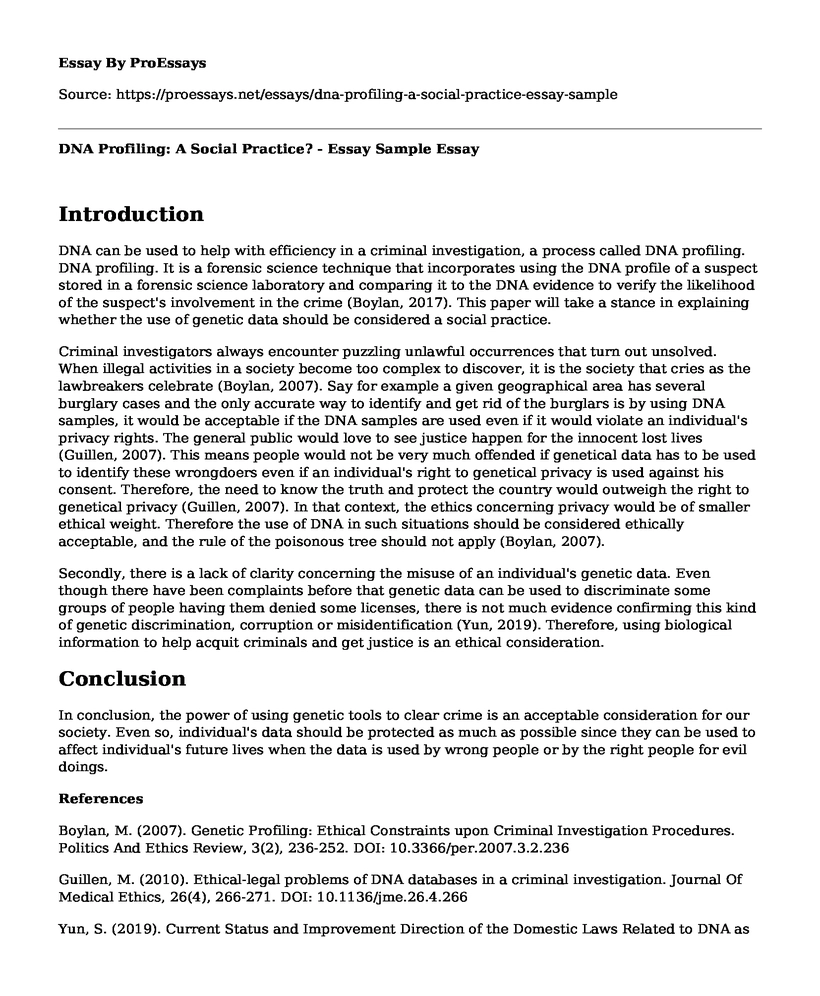Introduction
DNA can be used to help with efficiency in a criminal investigation, a process called DNA profiling. DNA profiling. It is a forensic science technique that incorporates using the DNA profile of a suspect stored in a forensic science laboratory and comparing it to the DNA evidence to verify the likelihood of the suspect's involvement in the crime (Boylan, 2017). This paper will take a stance in explaining whether the use of genetic data should be considered a social practice.
Criminal investigators always encounter puzzling unlawful occurrences that turn out unsolved. When illegal activities in a society become too complex to discover, it is the society that cries as the lawbreakers celebrate (Boylan, 2007). Say for example a given geographical area has several burglary cases and the only accurate way to identify and get rid of the burglars is by using DNA samples, it would be acceptable if the DNA samples are used even if it would violate an individual's privacy rights. The general public would love to see justice happen for the innocent lost lives (Guillen, 2007). This means people would not be very much offended if genetical data has to be used to identify these wrongdoers even if an individual's right to genetical privacy is used against his consent. Therefore, the need to know the truth and protect the country would outweigh the right to genetical privacy (Guillen, 2007). In that context, the ethics concerning privacy would be of smaller ethical weight. Therefore the use of DNA in such situations should be considered ethically acceptable, and the rule of the poisonous tree should not apply (Boylan, 2007).
Secondly, there is a lack of clarity concerning the misuse of an individual's genetic data. Even though there have been complaints before that genetic data can be used to discriminate some groups of people having them denied some licenses, there is not much evidence confirming this kind of genetic discrimination, corruption or misidentification (Yun, 2019). Therefore, using biological information to help acquit criminals and get justice is an ethical consideration.
Conclusion
In conclusion, the power of using genetic tools to clear crime is an acceptable consideration for our society. Even so, individual's data should be protected as much as possible since they can be used to affect individual's future lives when the data is used by wrong people or by the right people for evil doings.
References
Boylan, M. (2007). Genetic Profiling: Ethical Constraints upon Criminal Investigation Procedures. Politics And Ethics Review, 3(2), 236-252. DOI: 10.3366/per.2007.3.2.236
Guillen, M. (2010). Ethical-legal problems of DNA databases in a criminal investigation. Journal Of Medical Ethics, 26(4), 266-271. DOI: 10.1136/jme.26.4.266
Yun, S. (2019). Current Status and Improvement Direction of the Domestic Laws Related to DNA as Forensic Evidence. The Korean Academy Of Scientific Criminal Investigation, 13(3), 187-197. DOI: 10.20297/jsci.2019.13.3.187
Cite this page
DNA Profiling: A Social Practice? - Essay Sample. (2023, Feb 17). Retrieved from https://proessays.net/essays/dna-profiling-a-social-practice-essay-sample
If you are the original author of this essay and no longer wish to have it published on the ProEssays website, please click below to request its removal:
- Personal Liberty Violations Essay Example
- Forensic Science: An Article Review From the Journal of Forensic Sciences, Philadelphia
- Essay Sample on Gender, Criminology & Androcentric Realities
- Essay Example on Secure Your Rights: Include Bill of Rights in the Constitution
- Essay Example on the Harsh Childhood of H.H. Holmes, America's First Serial Killer
- Essay Example on Victims of Crime: Rights and Benefits Enshrined in the Constitution
- Essay Example on Abortion Debate: Pro-Choice and Pro-Life Views in 2021







